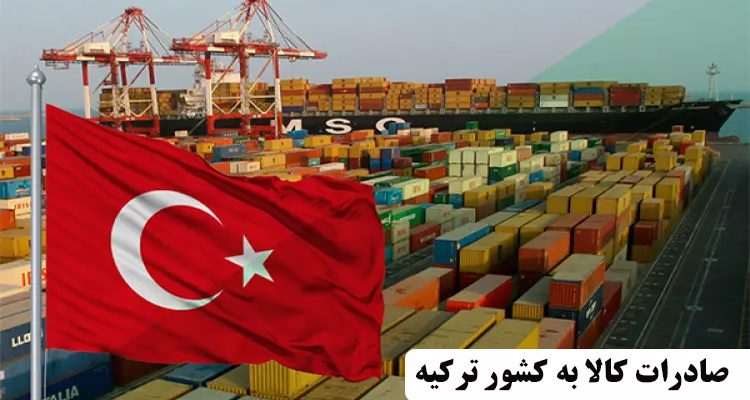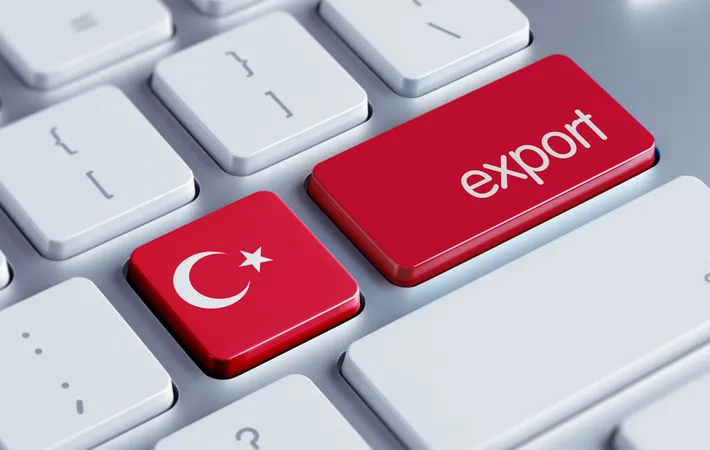Export to Turkey

Introduction to Export to Turkey
Turkey, which is located adjacent to the borders of our country Iran, has maintained friendly and positive relations with Iran due to the common culture and history shared between the two nations. This close bond has paved the way for numerous and beneficial trade opportunities for both countries. In recent decades, Iranian merchants, by identifying and utilizing these opportunities, have increased the volume of exports to Turkey, resulting in a significant growth in this area. This increase in exports has not only helped strengthen the domestic economy but has also led to deeper diplomatic and commercial relations between the two countries.
However, exporting goods to Turkey requires awareness and strict adherence to the trade laws and regulations set by the governments of both countries. These laws include matters such as quality standards, customs regulations, and trade tariffs, which are vital for any merchant intending to export Iranian goods to the Turkish market. Familiarity with these regulations and compliance with them can prevent potential problems and financial risks in the future. Therefore, it is recommended that before starting the export process, one should carefully study and understand these laws.
In the following sections of this article, we will take a closer look at the Turkish export market, the rules and regulations governing it, and also introduce popular Iranian goods that have high export potential to Turkey. This information will help you look at export opportunities with a broader and more informed perspective and ultimately achieve greater success in the field of international trade.
The steps of exporting to Turkey
First Step: Market Analysis for Exporting to Turkey
At the beginning of the export journey to Turkey, having a trade card is an obvious and essential requirement. After selecting the product you intend to export to this country, you must conduct a detailed analysis of the market related to that product in Turkey. This analysis includes assessing the level of demand, understanding competitors, and examining prevailing prices in the market. Additionally, accurately calculating the total costs and potential profit is of high importance. This process, which may take months to complete, provides a solid foundation for entering the Turkish export market and prevents potential problems in the future. This initial step, which is of special importance, requires a significant investment of time and effort, but the value of this investment should not be underestimated considering the comprehensive knowledge and information it provides you with.
Second Step: Acquiring Information on Export Regulations to Turkey
At this stage of the export process, you must carefully study and become familiar with the laws and regulations related to exporting to Turkey. This includes choosing appropriate and effective export methods that are compatible with Turkish standards and requirements. For some goods, obtaining specific permits is necessary, so you must be fully aware of the rules associated with the goods you intend to export. In addition, obtaining a certificate of origin from the relevant chamber of commerce is mandatory for the export of any type of goods. This certificate indicates the origin of the goods and without it, the clearance of goods from Turkish customs will not be possible. Therefore, it is recommended that before proceeding with exports, you thoroughly review and understand these regulations to prevent any potential problems in the future.

Step Three: Implementing the Export Process to Turkey
After acquiring sufficient knowledge about export regulations and a precise understanding of the market and competitive prices in Turkey, it’s time to enter the practical phase of exporting. At this stage, you should contact transportation companies and receive price quotes based on the specifications of your goods, including type, weight, and packaging method. After selecting the best option for transportation, begin loading the goods and direct them towards the customs destination in Turkey. Although the land route through the Bazargan border is one of the most common transportation methods, depending on your specific needs and conditions, you may also consider using air or sea transportation.
Step Four: The Process of Clearing Goods through Turkish Customs
At this stage, your goods, after crossing the borders of Iran, enter Turkish customs. Now is the time to proceed with the clearance of goods. This process requires full familiarity with Turkish customs laws and regulations. You must be aware of the necessary permits and also the required documents for clearance, as without this information, it will not be possible to obtain clearance permission. After completing the clearance process and the goods exit customs, you can offer your goods in the Turkish market and sell them. This final step marks the end point of your export journey, and success in it will be the result of your efforts and precise planning in the previous stages.
Required Documents List for Exporting to Turkey:
CE Certificate: This certificate indicates that the exported goods comply with the European Union’s requirements in terms of safety, health, and environmental protection. Having this certificate is mandatory for exporting to Turkey and selling within the European Economic Area.
Certificate of Origin: This document is issued by the Chamber of Commerce of the exporting country and verifies the place of production of the goods. Obtaining a certificate of origin is essential for each export shipment.
Sales Invoice: This document is issued by the seller and includes details such as the type, quantity, and price of the exported goods.
Proforma Invoice (Proforma): The proforma invoice is issued by the seller to determine the price and terms of sale of the goods and includes all details related to the exported goods.
Health Certificate: This document is issued by the seller or the exporting country and guarantees the health of the exported goods.
Export Technical Documents File: This collection includes documents such as the user manual, standards, and technical instructions and is mandatory for exports to Turkey.
Transportation Certificate: This certificate includes the specifications of the exported goods and is issued in three copies, which are respectively provided to the buyer, the seller, and the customs.
A Look at Turkish Customs Regulations:
Turkey, like other countries around the world, has developed a set of import regulations to control and organize its international trade. These regulations, designed to facilitate trade exchanges with other countries, are not an obstacle for importers, but rather assist them in importing their goods with full awareness of the regulations and offering them in the Turkish market. In the following, we have examined these regulations more closely.

The Most Profitable Goods for Export to Turkey
- Oil and Petrochemical Products: These are among the most important export products from Iran to Turkey.
- Various Metals: Including metals like iron, steel, copper, and other minerals.
- Food Products: Such as saffron, pistachios, dates, raisins, watermelons, fruit juices, seedless grapes, and fresh and dried bananas.
- Agricultural Products and Animal Derivatives: Including livestock and poultry feed and animal products.
- Industrial Products: Like machinery, fiberboards, and items made from wood.
Customs Clearance of Goods in Turkey:
At first glance, customs clearance of goods in Turkey may seem like a difficult task, but with sufficient information and proper preparation, this process can be simplified and made hassle-free. One of the most important factors that can expedite and facilitate this process is proficiency in the Turkish language. Knowing Turkish allows you to easily communicate with customs officials, reduce administrative complexities, and carry out the clearance of your goods with greater speed and accuracy.
Furthermore, the Turkish language can assist in establishing communication with local traders and merchants, as well as in better understanding the Turkish business culture. This can significantly impact the marketing and sales of your products in the Turkish market, allowing you to compete with greater confidence in this competitive market.
For the purpose of customs clearance, it is necessary to prepare and present relevant documents such as commercial invoices, certificates of origin, certificates related to product standards, and the necessary permits from the relevant authorities. Additionally, familiarity with Turkish customs laws and regulations and the calculation of tariffs and import taxes can aid you in the customs clearance process.
Finally, it is recommended to use the services of an experienced and knowledgeable customs lawyer or consultant to ensure a correct and problem-free clearance process. These professionals can assist you in overcoming potential obstacles and completing all legal steps with their experience and knowledge.
Import Customs Duties in Turkey:
The Turkish customs authority plays a significant role in supporting domestic production and regulating the import market by setting various customs duties. These duties are designed to encourage domestic manufacturers and control the quality of imported goods. Higher duties are imposed on goods that have domestic equivalents to prevent unfair competition with domestic producers.
For this reason, choosing goods that are not mass-produced in Turkey and therefore subject to lower customs duties can be an effective strategy for reducing import costs and increasing profitability. This is particularly important for businesses looking to expand their commercial activities in the Turkish market.
Moreover, being aware of the different rates of customs duties for various types of goods and categories is of high importance. This knowledge allows traders to plan more precisely, avoid additional costs, and optimize the import process. Additionally, understanding the customs laws and regulations of Turkey and any potential changes in these laws can help traders prevent any legal issues or potential fines.
Finally, it is advised to consult with an experienced customs consultant before exporting to be informed of the latest changes in customs duty rates and import regulations, allowing you to make more informed decisions. This step can significantly assist you in reducing costs and increasing profitability.

Exporting to Turkey with Low Capital:
Exporting to Turkey can be feasible with reasonable capital and meticulous planning. While products such as petroleum derivatives and saffron are among the popular goods for export, there are other methods available for exporting with low capital. For instance, you can enter the Turkish market by focusing on exporting small and lightweight goods that require less investment. Suitcase exports are also an effective method for shipping small quantities of goods, which can serve as a starting point for gaining experience and understanding the Turkish market, ultimately leading to profitability.
Several Important Tips for Exporting to Turkey
To succeed in exporting to Turkey, knowing key points and market intricacies is extremely important. Here, we have elaborated on the points you should consider before starting to export:
Detailed Market Analysis: Before any action, carefully analyze the Turkish market for your intended product. This includes understanding competitors, market demand, and available opportunities.
Pricing Review: Ensure that you are aware of your product’s competitive prices in the Turkish market and that your pricing is in line with the target market.
Familiarity with Regulations: Gain a complete understanding of Turkey’s export laws and regulations, including customs and tax laws, to prevent any legal issues.
Appropriate Packaging: Ensure that your goods are transported with standard and reliable packaging to prevent damage and potential losses.
Proficiency in Turkish or English: Having proficiency in Turkish or English can be very beneficial in establishing business communications and expanding your business in Turkey.
Financial Planning: Carefully plan your budget and investments to achieve the best return from your export activities.
Networking: Building strong connections with local traders and merchants can help you better understand the market and find new opportunities.
Iran-Turkey Joint Chamber of Commerce:
In the past decade, trade ties between Iran and Turkey have been significantly strengthened, leading to the establishment of the Iran-Turkey Joint Chamber of Commerce as an institution to facilitate and develop these relations. This chamber serves as a bridge between the merchants and traders of the two countries, offering a variety of services including legal consultation, market information, and organizing exhibitions and trade conferences.
By visiting the Iran-Turkey Joint Chamber of Commerce, you can stay informed about the latest news and developments in trade, participate in training workshops, and benefit from the experiences and knowledge of veteran managers and merchants. Additionally, this chamber can assist in processes related to exports and imports, obtaining necessary permits, and establishing effective trade connections.
Therefore, if you are looking to expand your business in the Turkish market or intend to take steps in this direction, the Iran-Turkey Joint Chamber of Commerce can be a valuable resource for acquiring information, networking, and receiving specialized support. With its practical guidance and creation of new business opportunities, this institution plays a significant role in strengthening bilateral relations and developing trade between the two countries.
Tata Trading Company’s Export of Goods
Considering the challenges and complexities of the export process, Tata Trading Company, leveraging its extensive knowledge and experience in international trade, is ready to offer advisory and operational services to esteemed companies and merchants. At Tata Trading Company, with the provision of innovative and optimal solutions, we guarantee that your goods will be exported in the best possible manner, adhering to all international standards.
At every stage of the export process, including the preparation of necessary documents, standard packaging, transportation, customs clearance, and ultimately the delivery of goods to the customer, we are with you. Utilizing a vast network of business partners around the world, Tata Trading Company is able to provide the best transportation options for your goods and ensure that your goods reach your customers on time and without any issues.
By trusting Tata Trading Company, you can focus on expanding your business. For more information and free consultation, please contact us.

